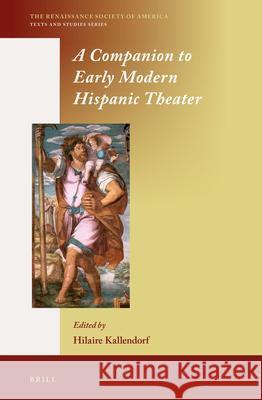A Companion to Early Modern Hispanic Theater » książka
A Companion to Early Modern Hispanic Theater
ISBN-13: 9789004234567 / Angielski / Twarda / 2014 / 388 str.
A panoramic, state-of-the-art handbook destined to chart a course for future work in the field of early modern Hispanic theater studies. It begins in the closet with an essay on Celestina as closet drama and moves out into the court to explore intersections with courtly love. An essay on the comedia and the classics demonstrates this genre's firm grounding in the classical tradition, despite Lope de Vega's famous protestations to the contrary. Distinct but related genres such as the autos sacramentales and the entremeses also make an appearance. The traditional themes of honor and wife-murder share the stage with less familiar topics like the incorporation of animals into performance. This volume covers the urban space of the city in Spain and Portugal as well as uncharted territories in the New World and Japan. Essays on emblems and the picaresque round out this anthology, along with studies of theatrical representations of early modern innovations in science and technology. The book concludes with two different psychoanalytical approaches, focused on melancholy and Lacanian tragedy, respectively. This collection incorporates the work of younger scholars along with established names in the field to synthesize the most exciting recent work on the comedia and related forms of early modern Hispanic theatrical production. Contributors include: Ignacio Arellano, Frederick de Armas, Henry Sullivan, Edward Friedman, A. Robert Lauer, Manuel Delgado, Adrienne Martin, Enrique Garcia Santo Tomas, Matthew Stroud, Teresa Scott Soufas, Enrique Fernandez, Maria Mercedes Carrion, Robert Bayliss, Ted Bergman, Cory Reed, Maryrica Lottman, Christina Lee, and Enrique Duarte.











